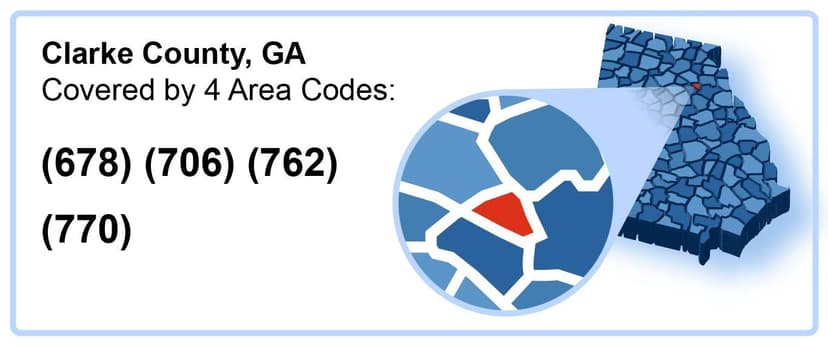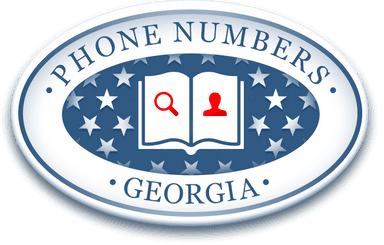Area Code 678

An area code is a three-digit number prefixed to a North American phone number and indicates its Numbering Plan Area (NPA). The North American Numbering Plan (NANP) established area codes in 1947 to facilitate long-distance calls and identify the origin of phone calls. In Georgia, the implementation and regulation of area codes are handled by the Georgia Public Service Commission. Four area codes currently cover the entire Clarke County. These are:
Area code 678 was officially commissioned in January 1998. It is an overlay code for area codes 404 and 770 and was overlaid by area code 470 in 2010. Places under the coverage of this area code in Clarke County include Candler-Mcafee, Sandy Springs, East Point, North Atlanta, Forest Park, Tucker, and College Park.
Area Code 706
Area code 706 was put into service in May 1993 and created from a split of the 404 NPA. Area code 706 covers Athens, Augusta, Rome, Dalton, and Martinez in Clarke County.
Area Code 762
Area code 762 is a NANP overlay code for the 706 NPA. It was officially launched into service in May 2006. It covers the same cities as area code 706.
Area Code 770
Area code 770 became active in August 1995 and was created from a split of the 404 NPA. In Clarke County, area code 770 serves Alpharetta, Douglasville, College Park, Duluth, Dunwoody, Griffin, Gainesville, and Mableton. Lawrenceville, Peachtree City, Roswell, Smyrna, Atlanta, Marietta, and Tucker are also within the 770 NPA.
What are the Best Cell Phone Plans in Clarke County?
A survey carried out in 2018 by the National Center for Health Statistics (NCHS) reported that an estimated 59.0% of Georgia residents over 18 year depended on wireless-only telephony services. On the other hand, 3.5% still used landline-only telephony services. In the same vein, about 69.2% of children under 18 years used cell phones solely for telecommunications, while only about 2.7% relied on landlines exclusively. The survey confirmed that wireless-only telephony services dominate the telecommunication space in Clarke County.
The four major phone carriers, AT&T, Verizon, T-Mobile, and Sprint, all offer good network services and coverage in Clarke County. T-Mobile and AT&T provide the best services in the county, with about 84% network coverage each. Verizon has an estimated 80% penetration, while Sprint has the least coverage at about 62%. Mobile Virtual Network Operators (MVNOs) also provide wireless services in the county. However, MVNOs do not have the infrastructure for wireless network services, so they rely on the major carriers to serve county residents.
Voice over Internet Protocol (VoIP) is an alternative means of telephony in Clarke County. Instead of using regular phone lines, users can make phone calls over a broadband internet connections. A VoIP call either requires a computer, a landline phone connected to a VoIP adapter, or a specialized VoIP telephone.
What are Clarke County Phone Scams?
Clarke County phone scams are deceptive attempts coordinated using telephone services to illicitly obtain money or other valuables such as personal information from county residents. Scammers often employ phone spoofing to hide their real identities and impersonate reputable agencies. Residents can identify spoofed calls using reverse phone lookup applications. Residents may also report suspected scam activities over the phone to the appropriate security agencies for proper investigation and actions. Prevalent phone scams to be wary of in Clarke County include:
What are Clarke County Charity Scams?
Scammers impersonate reputable charity organizations to solicit donations from Clarke County residents through phone calls. Although it is possible to get donation appeals from legitimate charity organizations, residents may be wary of scammers engaged in charity solicitations for personal benefits. They usually take advantage of disasters to solicit funds from unsuspecting persons. The Georgia Consumer Protection Division provides residents with information on charitable giving. Residents are encouraged to verify the authenticity of charitable organizations before making donations.
Excessive appeal to people's emotions while soliciting donations is a pointer to charity scams. These scammers usually decline requests to provide comprehensive information about their identities and the charities they represent. Good reverse phone lookup services can help residents to uncover the real identities of such callers. Residents who suspect illegal charity solicitations may file their reports with the Charities Division of the Georgia Secretary of State.
What are Clarke County Investment Scams?
These scams involve scammers enticing residents with attractive investment offers with purportedly little or no risk and high returns in an attempt to defraud them. They usually pretend to be with legitimate investment companies. To achieve this, they spoof their phone numbers to imitate the official phone numbers of the companies they impersonate. Residents targeted with these scams can retrieve the identities of such callers using reverse phone lookup services.
Another common tactic used in investment scams is obtaining targets’ financial and personal information for supposed verifications for accuracy. Most legitimate investment organizations esteem the need for financial security and do not request such information over the phone. As such, residents should ignore unknown callers who make such demands. The Georgia Department of Law, through its Consumer Protection Division, urges residents to report Investment scam incidents to the appropriate security agencies for proper investigations.
What are Clarke County Jury Duty Scams?
In these scams, Clarke County residents receive notifications of arrest warrants over the phone from persons who pose as law enforcement officers or court representatives. The scammers claim that the arrest warrants are for missed jury duty. They offer to cancel the arrest warrants if the call recipients pay them some amount of money. To appear convincing, the scammers may forward fake warrant documents to the targets. In other cases, they request targets’ information for supposed confirmation of warrant details. They usually spoof their phone numbers to make their calls appear as coming from law enforcement or the court. Residents, who get such calls can use free reverse phone number lookup services to answer the question "who is this number registered to?"
Government agencies do not request confidential information from residents via phone calls. They also do not ask for money over the phone to cancel arrest warrants allegedly issued for missed jury duty. Residents are advised to ignore phone calls making such requests and report them to the appropriate agencies.
What are Clarke County IRS Tax Scams?
These scams are especially rampant during tax filing seasons. Scammers pose as representatives of the Internal Revenue Service (IRS) to collect tax payments from uninformed residents. In the process of collections, they attempt to obtain personal or financial information from targets for identity and financial theft. These scammers spoof their phone numbers to make their targets’ Caller ID display genuine IRS phone numbers. Residents who do not respond to their demands are often threatened with legal actions such as deportation and arrests. IRS scams primarily target residents who are not conversant with how the IRS operates, such as non-English residents, elderly residents, and new immigrants.
These scammers typically demand on-the-spot tax payments via payment channels such as wire transfers or debit cards. Residents should beware of scams in which the perpetrators impersonate IRS employees. Any resident who suspects that an IRS scam can uncover the caller's real identity using a reverse cell phone lookup application. Victimized residents should report tax scam incidents to the IRS online.
What are Robocalls and Spam Calls?
Robocalls are a special kind of phone calls configured to deliver recorded messages through auto-dialers. It is commonly used in telemarketing sales and political campaigns. Residents may receive robocalls exclusively for disseminating information, such as flight cancellations or robocalls from debt collectors, charities, and health care providers without prior permission. However, it is vital to watch out for scammers who use robocalls to defraud residents. The actual identities of such scammers can be retrieved using reverse phone number lookup services.
Spam calls are irrelevant phone calls made indiscriminately for malicious purposes. Robocalls constitute a large percentage of spam calls, as revealed by the National Do Not Call Registry Data Book for Fiscal Year 2019. The report showed that over 3.7 million out of about 5.4 million unwanted calls were robocalls. To avoid getting scammed by robocalls, Clarke County residents can take the following actions:
- Do not entertain robocalls. Responding to the prompts only leads to more robocalls and increases the possibility of getting scammed.
- Identify and block unwanted calls using call blocking apps. The FTC provides residents with comprehensive information on how to block unwanted calls.
- Register your phone number with the FTC's National Do Not Call Registry to reduce the influx of robocalls.
- Use online services that offer free phone number lookup by name or address to determine if incoming calls are robocalls.
- Submit a report of robocall abuse to the Office of the Attorney General and provide the information required to inspect and manage scam cases properly.
How Can You Spot and Report Clarke County Phone Scams?
Scammers regularly tweak their scam schemes to make them more challenging to identify and prevent. Government, through various agencies, provides helpful information in its quest to protect residents from falling victim to phone scams. Such information assists people in understanding the warning signs of phone scams and how best to avoid them, thus helping to reduce the rate of scams in Clarke County. The common indications that a phone call intends to dupe its recipient include:
- Callers who request confidential information such as credit/debit card details are likely scammers. Legitimate organizations do not request such information.
- Requests for payments through odd payment methods such as gift cards, cash payments, and wire transfers suggest scams.
- When a caller tries to pressure you to respond or make payments immediately, the chances are high that it is a scam.
- Callers who threaten you with extreme actions such as license revocation, arrest, deportation, or lawsuit are most likely scammers.
- Callers observed to have altered their phone numbers to appear like those of legitimate entities are potential scammers. You can uncover an unknown caller’s actual identity using reverse phone number lookup services.
Some government agencies provide Clarke County residents with information on how phone scammers operate. These agencies also receive phone scam reports and take appropriate actions against fraudsters. They include:
Clarke County Sheriff's Office - The Clarke County Sheriff's Office ensures that residents do not fall prey to phone scammers by providing necessary information about scams and how to avoid them. Residents can report phone scam incidents to the Sheriff's Office by calling (706) 613-3795.
Georgia Office of the Attorney General - The Consumer Protection Division of the AG’s office regularly provides information to educate residents on trending phone scams. They also make provision for Consumer Complaint Form to enable residents to file phone scam complaints.
Federal Trade Commission - Besides providing adequate information about phone scams, the FTC also allows residents to file phone scam reports online. The FTC manages the National Do Not Call Registry to prevent robocalls scams by limiting the number of robocalls received by registered phone numbers.
Federal Communications Commission - By collecting complaints via its Consumer Complaint Center, the FCC assists residents in the fight against phone scams.
